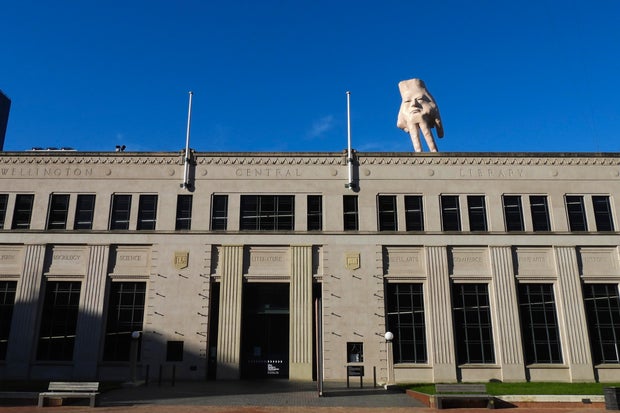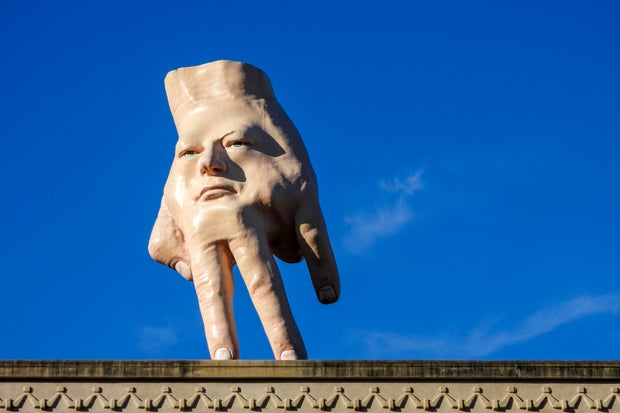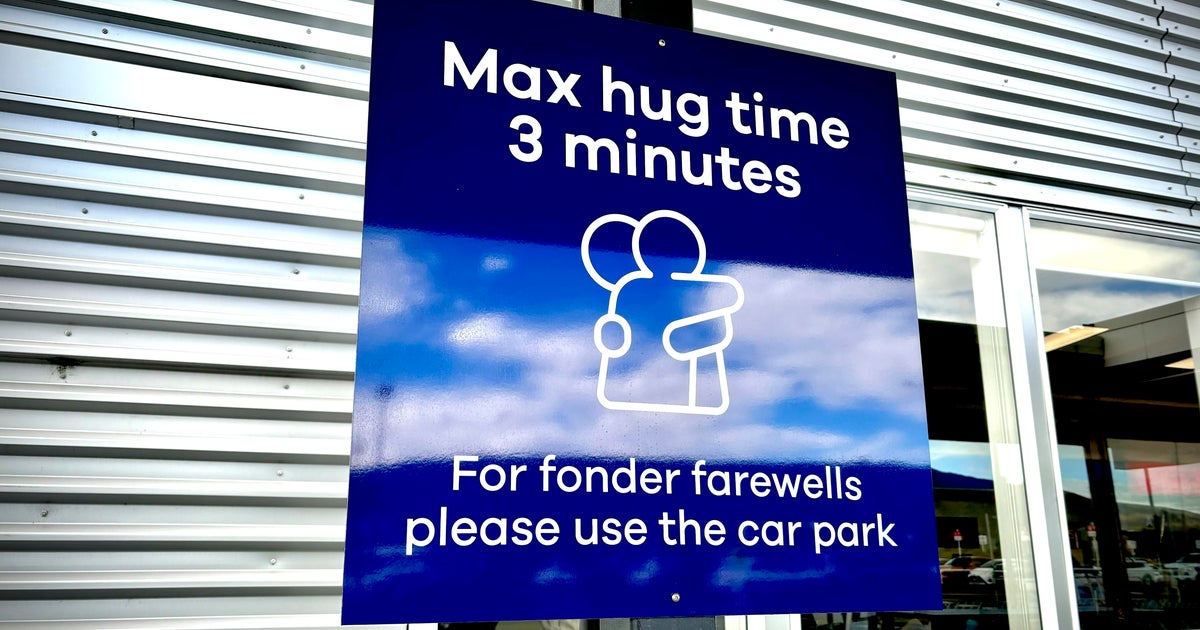CBS News
Controversial giant hand’s removal from top of New Zealand building is proving controversial

Wellington, New Zealand — Perched on two fingers on the roof of an art gallery in Wellington, New Zealand, the giant sculpture of a hand has loomed over the city for five years.
Named Quasi, the 16 feet creation of Australia-based sculptor Ronnie van Hout bears an unsmiling human face – because why not?
Some found it disturbing and now, after five years of provoking controversy and myriad emotions – from horror and revulsion to delight – among residents of New Zealand’s capital, Quasi will be removed from the roof of City Gallery this week.
Charlotte Graham-McLay / AP
It will be taken to a new home, the gallery said Wednesday.
“This is either a great day for Wellington or a terrible day for Wellington and there’s not much view in between,” said Ben McNulty, a Wellington city council member.
Personally, McNulty told The Associated Press, he felt “devastated” by the sculpture’s departure.
Quasi is made of steel, polystyrene and resin, and was based on scans of van Hout’s hand and face. It was named in part for Quasimodo, the bellringer in Victor Hugo’s 1831 novel “The Hunchback of Notre-Dame.”
Hence the male gender some have attributed to Quasi.
Charlotte Graham-McLay / AP
Quasi first graced – or haunted – an art gallery in Christchurch, New Zealand, in 2016 but proved polarizing. It was the subject of an op ed in the local newspaper listing reasons the sculpture “must go,” including claims that one of its outstretched fingers “appears to be inappropriately and belligerently pointing at pedestrians and office workers.”
“Perhaps the monster just wants to be loved?” van Hout responded at the time.
In 2019, Quasi was installed in Wellington, where he grew over time on its residents.
“He arrived and I won’t say the city unanimously hated him but I reckon 80% were like, ‘What is this monster? What have we done?'” McNulty said.
“But I think that over time there’s been a bit of a softening, there’s sort of a pro-Quasi group, which I consider myself part of,” he added.
On Wednesday, many at Wellington’s Civic Square, where the gallery with Quasi is located, said they had warmed to him too.
“It’s really disturbing but it’s a staple of Wellington now,” said Anja Porthouse, who had brought friends and family to see Quasi and was “gutted” it was leaving.
Quasi is to be lifted from the roof by helicopter on Saturday, when the giant hand will travel to an undisclosed location in Australia, the gallery said.
“Everything comes to an end eventually,” van Hout told the AP. “I am sure it will be missed, but even Lovecraftian nightmares have to return to where they came from, and now you only have an absence to reflect on.”
Dozens responded to the news on social media with dismay, glee and jokes about the curse that local lore has attributed to Quasi being lifted.
The sculpture has adorned the Wellington skyline during “some of its most difficult times,” McNulty said. The city has struggled with earthquake-prone buildings, widespread plumbing problems and political division in recent years.
Other comments took guesses about where Quasi might end up.
“He’s going to The Hague,” wrote one New Zealander on X.
“He will be missed,” said Jane Black, who heads the Wellington Sculpture Trust.
“I’ll personally be pleased to see it head somewhere else for a change,” the city’s mayor, Tory Whanau, told the AP. “I think there’s a strong feeling of relief.”
CBS News
Here Comes the Sun: Jack Antonoff and more

Watch CBS News
Be the first to know
Get browser notifications for breaking news, live events, and exclusive reporting.
CBS News
Capturing Moriah Wilson’s Killer – CBS News

Watch CBS News
Be the first to know
Get browser notifications for breaking news, live events, and exclusive reporting.
CBS News
How to watch the Minnesota Vikings vs. Chicago Bears NFL game today: Livestream options, more

Getty Images
The Minnesota Vikings will take on the Chicago Bears today. The Vikings are currently 8-2, an impressive run so far this season, and will be looking to add a fourth win to their current streak after last Sunday’s 23-13 win against the Tennessee Titans. The Bears, on the other hand, are entering this game on the heels of a four-game losing streak after a tough 20-19 loss against the Green Bay Packers last Sunday.
Here’s how and when you can watch the Vikings vs. Bears game today, whether or not you have cable.
How and when to watch the Minnesota Vikings vs. Chicago Bears
The Vikings vs. Bears game will be played on Sunday, November 24, 2024 at 1:00 p.m. ET (11:00 a.m. PT). The game will air on Fox and stream on Fubo and the platforms featured below.
How and when to watch the Minnesota Vikings vs. Chicago Bears game without cable
You can watch this week’s NFL game on Fox via several streaming services. All you need is an internet connection and one of the top options outlined below.
Fubo offers you an easy, user-friendly way to watch NFL games on CBS, Fox, NBC, ABC, ESPN, and NFL Network, plus NCAA football channels. The Pro tier includes 200+ channels and unlimited DVR, while the Elite with Sports Plus tier adds NFL RedZone and 4K resolution. New subscribers get a seven-day free trial and all plans allow streaming on up to 10 screens simultaneously.
You can watch today’s game with a subscription to Sling’s Orange + Blue tier, which includes ESPN, ABC, NBC, and Fox. The plan offers 46 channels with local NFL games, nationally broadcast games and 50 hours of DVR storage. For complete NFL coverage, add Paramount+ to get CBS games, or upgrade with the Sports Extra add-on for additional sports channels like Golf Channel, NBA TV and NFL RedZone.
Watching NFL games, including Fox broadcasts, is simple with Hulu + Live TV, which includes 90 channels, unlimited DVR storage, and access to NFL preseason games, live regular season games and studio shows. The service includes ESPN+ and Disney+ in the subscription.
Want to watch today’s game live on your smartphone? If so, NFL+ streaming service is the solution you’re looking for. It lets you watch NFL Network and out-of-market games on mobile devices, with an upgrade option to NFL+ Premium that includes NFL RedZone for watching up to eight games simultaneously. Note that NFL+ only works on phones and tablets, not TVs.











